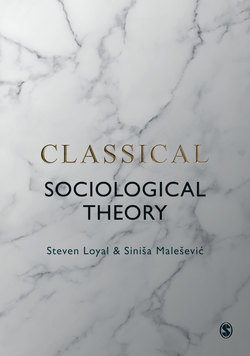Читать книгу Classical Sociological Theory - Sinisa Malesevic - Страница 21
На сайте Литреса книга снята с продажи.
The Ideal State and the Division of Labour
ОглавлениеFor Socrates humans have a multiplicity of needs and a state comes into existence in order to meet these mutual needs ‘because no individual is self-sufficing; we all have many needs’ (Plato, 1945: II.368). When people coalesce in a certain location to meet one another’s needs, this forms a state. It is also on this basis that the division of labour develops. Although discussion of the division of labour is often attributed to Adam Smith and Émile Durkheim, it has its first systematic, though condensed, discussion, in Plato’s work.
According to Plato, individuals are born with different natural capacities, aptitudes and talents that subsequently need to be developed and perfected through training. They are also naturally suited to perform one type of activity rather than many. Since ‘no two people are born exactly alike’, this permits them to be funnelled into specific types of job. Society and the individuals that compose it are thereby better off by restricting themselves to one trade or vocation: a farmer should remain a farmer, a craftsman a craftsman, etc. This specialisation of tasks and roles, given by nature, leads to greater efficiency and excellence: ‘more things will be produced and the work be more easily and better done, when every man is set free from all other occupations to do, at the right time, the one thing for which he is naturally fitted’ (Plato, 1945: II.370). Justice at the level of a city-state is thereby grounded in a such a mutually beneficial, co-operative division of labour based on differing natural aptitudes in which each individual follows just one task. When individuals follow their naturally given endowments and assume their allotted role in a complex interdependent division of labour, a just and harmonious social order ensues.
Plato’s definition of political justice in the city-state is, prima facie, rather odd. It does not refer to behavioural criteria or individual actions. Instead, it is grounded on each individual assuming a specialised place in a structural allocation of roles based on their natural aptitude. It is based on a specific hierarchical configuration of social relations drawing on the principle of individual differentiation, of remaining in one’s function and effectively ‘minding one’s own business’ and not interfering in others – ‘a man should possess and concern himself with what properly belongs to him’ (Plato, 1945: IV.433). Justice, dikaiosyne, the state of the man who follows dikē, is no more than minding your own business or following the way that is properly your own, and not mixing yourself up in the ways of other people.
Embellishing this conception, Plato argues for the establishment in the Ideal state of a tripartite class-system of philosopher rulers, warrior–soldiers, and producers and merchants. Justice then is when each individual is allocated to a position within an interdependent socio-economic class order consisting of producers, auxiliaries and guardians in which each individual and class keeps ‘to its own proper business in the commonwealth and does its own work’ (Plato, 1945: IV.434). Some men are naturally suited to philosophising, others to fighting, and others to producing and trading things. By remaining in these fixed roles the cumulative effect is to produce the best overall outcome for society – a harmonious social order ruled by the best.
